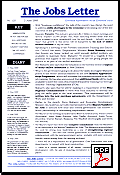



|
 |

|
| No.248 | 10 March 2006 | Essential Information on an Essential Issue |
of key events over the last few weeks. BUSINESS NZ: SKILL SHORTAGE SOLUTIONS WELLINGTON REGIONAL JOBS STRATEGY BILL PROPOSES PROBATIONARY PERIOD FOR NEW WORKERS YOUTH AND MINIMUM WAGE DEBATE STATE SECTOR REVIEW KIWISAVER SCHEME PRISONERS WORKING IN ORCHARDS MORE REDUNDANCIES AT AIR NZ IT INDUSTRY MALE DOMINATED DAIRY INDUSTRY TARGETS “CAREER CHANGERS” SPORTS CAREERS SUPPORT AUSTRALIAN SKILL SHORTAGE STRATEGIES  LAST Letter
LAST Letter
NEXT Letter   Download this issue as a PDF file
Index to Features
21 February 2006Air NZ's wide-bodied airplane maintenance workforce, including 121 licensed engineers will be laid-off. The airline will outsource the maintenance work to a European contractor saving the company up to $48 million over five years. Qantas Airlines is expected to follow the Air NZ example, saying it is hamstrung by a lack of flexibility and outmoded work practices while factories in Asia and elsewhere are offering record low prices and competitive turnaround times. 22 February 2006The New South Wales government is to cut 5,000 public service jobs and reduce employment conditions so that public servants lose protection from involuntary redundancies. 23 February 2006A National Certificate in Aviation (Flight Attendants) is launched following a report forecasting the need for 360 new flight attendants each year up to 2010. 24 February 2006High fees for medical courses in NZ have led to the shortage of doctors and dentists according to the NZ University Students' Association. Co-president Conor Roberts says the upcoming medical and dentistry funding review must address this problem as high fees either turn potential students away from studying medicine or drives them overseas once they finish. Up to 300 dairy workers are to lose their jobs as dairy giant Fonterra plans to shut down cheese processing plants in Auckland, Dunedin and Taranaki. The company's entire cheese cutting, grating and wrapping will be done at a second Taranaki site. The Australian Prime Minister John Howard calls for strategies to keep people aged between 55-64 in the workforce. Howard says that while the government needs to be involved, legislation is not the answer and that workforces and workplaces must be engaged in responding to the looming challenge of an ageing population. Canada has the second highest rate of skilled labour shortages after Mexico according to a survey by international employment company Manpower. The survey found there is a shortage in Canada of sales and customer representatives, engineers, drivers, mechanics, labourers, chefs, electricians, skilled trades and nurses. British workers expect to retire at 65 but most companies will expect them to work longer. A survey conducted by market research company NOP signals a divide between workers' and employers' retirement expectations. 26 February 200627 jobs are retained at Otaki's Pacific Plastic Recyclers after Work & Income agrees to provide Task Force Green funding to help support staff while a new factory is built to replace the one gutted by fire in January. 27 February 2006Hawkes Bay Prison inmates are working picking apples in local orchards. A 20% drop in the number of international students coming to Wellington is costing the regional economy $50 million. A report by Education Wellington International suggests the high NZ dollar, increased competition for foreign students, and fewer Chinese studying abroad have contributed to the drop. 28 February 2006The largest house price rises in NZ have been in regions with the most sun — and jobs. Motu Economic and Public Policy Research has found the biggest increases in house prices have been in warmer areas with more people — especially large, northern cities and holiday destinations. House prices fell in areas of stagnating or declining population with lower economic growth. Scotland's Fresh Talent initiative aims at attracting 50,000 immigrants per year. The Scottish Home Office is appealing to people from eastern European — Czech Republic, Estonia, Hungary, Latvia, Lithuania, Poland, Slovakia and Slovenia — to immigrate. Without significant numbers of new immigrants, Scotland's population will decline and the country will be unable to carry out many projects and services. 1 March 2006Replacing older, more experienced doctors and nurses with younger, cheaper staff is one means of containing healthcare costs within the future budget retraints, according to Auckland District Health Board chairman Wayne Brown. 2 March 2006Up to 170 staff lose their jobs as Southward Engineering closes its Lower Hutt and Auckland automotive parts plants. Western Australia's skills shortage will worsen due to the re-opening of Boddington gold mine, according to the Chamber of Minerals and Energy of Western Australia. The project's close proximity to Perth and the coast is likely to draw skilled workers away from more remote mining locations, as well as drawing in workers from non-mining sectors. 3 March 2006Up to 25 staff who prepare food at Christchurch Airport are laid-off. 2,500 engineering and maintenance jobs at Qantas are under threat as the airline strives to cut costs to remain competitive. 5 March 2006150 staff lose their jobs in the IT department at Carter Holt Harvey fueling speculation that the company will be broken up sooner rather than later following its takeover last year. The average NZ pay packet has lost value over the last 16 years, according to the Sunday Star Times. Quoting Statistics NZ figures, the paper points out that in 1989 the average NZ worker earned $530 per week. But the average wage at the middle of last year was $592 per week. Allowing for inflation, workers 16 years ago were earning the equivalent of $740 in today's dollar. Minister of Finance Michael Cullen argues that whether workers are better or worse off depends on what type of work they are in. He says there have been changes in relativity over the last 20 years. Cullen: "Freezing workers are an obvious example — they were right at the top for non-professional jobs 25 years ago but are much less so these days. But if you look at people like teachers and nurses, then no, there hasn't been a squeeze on those income in comparison with a broader range of incomes." China needs to create 9 million jobs a year just to maintain its official unemployment rate at 4.6%. 6 March 2006The new owner of NZ's most visited website Trade Me says the website will begin advertising job vacancies from the middle of 2006. Newspaper publisher Fairfax bought Trade Me for $700 million. 7 March 2006A glut of new restaurants opening in Queenstown and not enough trained chefs has led to restaurants cutting back on both menus and opening hours to keep going. 8 March 2006Up to 30 jobs will be lost at the Christchurch College of Education as part of restructuring.
 LAST Diary
LAST Diary
NEXT Diary 
|
BUSINESS NZ: SKILL SHORTAGE SOLUTIONS Business New Zealand has published a report on what it believes needs to be done to
address the country's skill shortages. Skills
Perspectives points out that for several years New Zealand
has regularly been ranked as having one of the worst skills shortages in the OECD. And Business NZ
chief executive Phil O'Reilly says that skill shortages are likely to remain one of the critical issues even
as economic growth inevitably slows down. Business New Zealand has published a report on what it believes needs to be done to
address the country's skill shortages. Skills
Perspectives points out that for several years New Zealand
has regularly been ranked as having one of the worst skills shortages in the OECD. And Business NZ
chief executive Phil O'Reilly says that skill shortages are likely to remain one of the critical issues even
as economic growth inevitably slows down.
O'Reilly: "As New Zealand seeks to become more productive we will need to concentrate even more on the skills of our workforce. Genuinely addressing skill shortages will require a range of responses, both short- and long-term and involving business, employees, unions, education providers, students, parents and government." — Immigration: streamline immigration procedures by relaxing or abolishing the requirement to prove that relevant skills are not available in New Zealand; increase the use of the `approved employer' immigration scheme; and develop cluster schemes for entire industries to recruit overseas — Training: increase the numbers in training and apprenticeships; remove or raise the cap on funding for training; put industry training and tertiary academic training funding on a more equitable footing; ensure there are adequate numbers of trainers and teachers to meet increased demand; create a more strategic approach to training provision between education providers and industry training organisations; strengthen links between training/education and business needs; support more innovative and flexible funding arrangement between government and training providers; and consider the possibility of shorter training times — Employment law: introduce a probationary employment period — Foundation skills: create a national strategy on literacy and numeracy in the workforce; increase workplace literacy and numeracy programmes; promote the benefits of literacy and numeracy programmes to employers; train tutors and industry trainers to address literacy and numeracy gaps — Trades promotion: get more information on trades careers to young people and improve attitudes towards the trades and trade training — Regulation: ensure occupational regulation does not unnecessarily restrict participation — Technology: provide more information to business on investing in technology and promote the benefits of increased technology use to employers — Retention: improve information available to companies on staff retention strategies and encourage increased training in retention strategies — Competitiveness: address the wider issues affecting international competitiveness including tax levels, resource management law, employment relations law and other impediments
WELLINGTON REGIONAL JOBS STRATEGY A group of about 80 Wellington employers, community groups, councils, industry groups
and educators have come together for the first time in an attempt to tackle the region's worsening
skills shortage. Porirua Mayor Jenny Brash, a core member of the Mayors Taskforce for Jobs, says
that while much of the country is suffering from a shortage of skilled workers, the Wellington region has
its own local issues that need dealing with. These include its large number of commuters,
significant populations of young people and of retirees, and infrastructure issues such as overloaded roads.
Brash says the group is developing a Wellington Regional Labour Market Strategy paper to address the
range of issues — a document that will be put out for consultation later this year. A group of about 80 Wellington employers, community groups, councils, industry groups
and educators have come together for the first time in an attempt to tackle the region's worsening
skills shortage. Porirua Mayor Jenny Brash, a core member of the Mayors Taskforce for Jobs, says
that while much of the country is suffering from a shortage of skilled workers, the Wellington region has
its own local issues that need dealing with. These include its large number of commuters,
significant populations of young people and of retirees, and infrastructure issues such as overloaded roads.
Brash says the group is developing a Wellington Regional Labour Market Strategy paper to address the
range of issues — a document that will be put out for consultation later this year.
Source — Dominion Post, 2 March 2006, "Combined effort to tackle skill shortage" by Sue Allen.BILL PROPOSES PROBATIONARY PERIOD FOR NEW WORKERS The establishment of a 90-day probationary period for new workers is soon to be debated
by parliament. The Employment Relations (Probationary Employment) Amendment Bill has been drawn
by ballot and its sponsor National MP Wayne Mapp says the legislation would encourage employers
to more readily take a chance on hiring new employees. The Bill provides an out for employers if
they decide a new worker isn't working out. Within the first 90 days the employer can sever the
relationship without facing the risk of expensive and protracted personal grievance procedures. The establishment of a 90-day probationary period for new workers is soon to be debated
by parliament. The Employment Relations (Probationary Employment) Amendment Bill has been drawn
by ballot and its sponsor National MP Wayne Mapp says the legislation would encourage employers
to more readily take a chance on hiring new employees. The Bill provides an out for employers if
they decide a new worker isn't working out. Within the first 90 days the employer can sever the
relationship without facing the risk of expensive and protracted personal grievance procedures.
Mapp: "The Bill will be a help to new workers. It will enable people who might otherwise be on the margins of the labour force to get a foot in the door. In effect, it will provide a chance for those who find getting that first job difficult, like new migrants, young people with few qualifications and people re-entering the workforce." Mapp points out that the government's small business advisory group described probationary periods as the "single most important change that could be made to employment legislation" that would lead directly and immediately to employment and business growth. Source — Media release National Party Wayne Mapp, 23 February 2006, "House to debate 90-day probation work bill"; media release National Party MP Wayne Mapp, 1 March 2006, "Employment Law Alert".
YOUTH AND MINIMUM WAGE DEBATEThe survey also found that even fewer businesses will be significantly affected when the minimum wage is raised from $9.50 to $10.25 per hour at the end of this month. And 69% of the businesses supported the government's plan to lift the adult minimum wage to $12 per hour within three years.
 Green MP Sue Bradford says it is very heartening to see that so many Wellington businesses
are relaxed and even supportive of the proposals to eliminate "poverty wages". She says they
understand that lifting wages at the bottom in fact helps the local economy by putting more spending power into
the pockets of those on the lowest incomes. Bradford: "I hope this survey will help put an end to the
myth that increasing the minimum wage and eliminating the lower minimum rate for young people is bad
for business." Green MP Sue Bradford says it is very heartening to see that so many Wellington businesses
are relaxed and even supportive of the proposals to eliminate "poverty wages". She says they
understand that lifting wages at the bottom in fact helps the local economy by putting more spending power into
the pockets of those on the lowest incomes. Bradford: "I hope this survey will help put an end to the
myth that increasing the minimum wage and eliminating the lower minimum rate for young people is bad
for business."
The Employers and Manufacturers Association says the current unemployment rate of nearly 12% for 15 to 19 year olds is likely to rise if youth rates are abolished. Employment services manager David Lowe says school leavers already find it hard enough to get started and the option to pay minimum youth rates often gets teenager's careers underway. Lowe: "Abolishing the youth rates would hurt teenagers more than help them because if an employer has a choice between a school leaver with no work experience, and a more experienced worker, they will choose the worker with more experience every time, unless there is an incentive to do otherwise." Source — Dominion Post, 27 February 2006, "Minimum wage rise backed" by Marta Steeman; media release, Green Party MP Sue Bradford, 27 February 2006, "Bradford boosted by business backing"; New Zealand Herald, 22 February 2006, "Jury out over youth rates", by Steve Hart; media release Employers and Manufacturers Association (Northern), 21 February, 2005, "Youth rates law would boost teenage unemployment"; media release, Maori Party MP, Tariana Turia, 22 February 2006, "Minimum Wage".
STATE SECTOR REVIEWSource — Media release, NZ government MP Trevor Mallard, 23 February 2006, "Reviews aimed at further improving public service"; media release National Party MP John Key, 23 February 2006, "Spending reviews more akin to toothpick than razor gang"; media release Public Service Association , 24 February 2006, "Union calls for govt supervision of job changes"; Dominion Post, 2 March 2005, "Public service audit not just a cost-cutting exercise for Labour".KIWISAVER SCHEMEKiwiSaver will be a voluntary scheme into which all employees, aged 18 - 65 years, can contribute to their own personalised account. The government will kick-start each person's KiwiSaver account with a contribution of $1,000 and will also make a contribution towards members' fees. The money in each individual account is "locked" for a minimum of five years of membership or until the saver become eligible for New Zealand superannuation. The "lock" can be broken for cases of financial hardship, permanent emigration or to make a contribution on buying a first home. — all workers are automatically enrolled (at 4%) unless they tell their employer (within six weeks) they don't want to be part of the scheme — there are two rates of contribution to the scheme: 4% or 8% of gross earnings — the contribution will be deducted each payday by the employer, as is done with PAYE tax — people can take a "contribution holiday" of five years — people take their account with them as they change jobs
 Minister of Finance Michael Cullen says enrolling employees automatically into
KiwiSaver makes participating in the scheme easy. Cullen: "This is the best way ahead. Workplace schemes
have the advantage of reaching a broad section of the population and international research shows more
will participate if enrolment in retirement schemes is automatic." Minister of Finance Michael Cullen says enrolling employees automatically into
KiwiSaver makes participating in the scheme easy. Cullen: "This is the best way ahead. Workplace schemes
have the advantage of reaching a broad section of the population and international research shows more
will participate if enrolment in retirement schemes is automatic."
 The Maori Party says the KiwiSaver Bill is a good idea but has been designed by people
who are divorced from the reality of the whanau of the working poor. MP Hone Harawira says a
minimum savings rate of 4% is a real problem for low-income working families. Harawira: "We note here that
for a young family with the breadwinner on a minimum wage, that will mean a drop in wages which
they simply cannot afford. We note that at 4%, the Bill also makes it impossible for beneficiaries to join
the scheme, and given that unemployment for Maori is three times higher than for the general
population, Maori will be doubly penalised." The Maori Party says the KiwiSaver Bill is a good idea but has been designed by people
who are divorced from the reality of the whanau of the working poor. MP Hone Harawira says a
minimum savings rate of 4% is a real problem for low-income working families. Harawira: "We note here that
for a young family with the breadwinner on a minimum wage, that will mean a drop in wages which
they simply cannot afford. We note that at 4%, the Bill also makes it impossible for beneficiaries to join
the scheme, and given that unemployment for Maori is three times higher than for the general
population, Maori will be doubly penalised."
Harawira points out that few Maori live past 65 years — the age at which people could expect to benefit from the savings scheme. Harawira says that while Maori, like everyone else, will be encouraged to join the KiwiSaver scheme, less than 4% of Maori will actually live long enough to derive any benefits. Source — National Business Review, 28 February 2006, "KiwiSaver scheme: Here it comes, ready or not; Inland Revenue website "KiwiSaver at a glance" www.ird.govt.nz/kiwisaver/summary; Media release NZ government deputy PM Michael Cullen, 28 February 2006, "KiwiSaver _ security and choice"; New Zealand Herald, 1 March 2006, "Employers face heat on savings" by Audrey Young; Sunday Star Times 5 March 2006, "KiwiSaver falls short" by Rob Stock; Sunday Star Times 5 March 2006, "KiwiSaver too hard for many" by Emma Page and Emily Watt; Debate in parliament on the KiwiSaver Bill by Maori MP Hone Harawira, 2 March 2006, "Kiwi Saver Bill - First Reading"
PRISONERS WORKING IN ORCHARDSThere are over 20 men currently picking fruit and prison authorities hope to get that number up to 60 inmates. Apple pickers commonly pick three to five bins of apples per day at an average rate of about $30 per bin but instead of paying the inmates, labour contractors pay the Department of Corrections. In turn, the department pays the inmate workers between 20c and 60c per hour — the amount they would receive working in any custodial job. The department uses the balance of the inmates' "pay" to cover their transportation and extra supervision costs. Orchardists have welcomed the prison workers, given that the seasonal demand for labour is intensifying. The Hawkes Bay Horticultural Contractors' Warren Templeton points out that the Hawkes Bay unemployment register is "just about non-existent" at this time of year — so the prisoners aren't taking away anyone's job. Source — New Zealand Herald, 28 February 2006, "Prisoners paid 20c an hours to pick fruit" by Simon Collins;MORE REDUNDANCIES AT AIR NZ Following the recent high-profile redundancies at its jet aircraft maintenance divisions, Air
New Zealand is now laying-off 470 head office staff. The announcement lifts the recent round
of redundancies at the airlines to over 900 people. Air New Zealand chief executive Rob Fyfe says
the airline has been sliding backwards financially and the major problem is the cost of fuel. Aircraft
fuel prices have risen 36% over the last six months. Fyfe: "This is not about outsourcing, this
is fundamentally saying for the last six months our fuel price is up $174 million. These are valuable
people — today making a valuable contribution — but simply the economics of the business don't allow us
to continue to be able to commit resources to some of those functions." Following the recent high-profile redundancies at its jet aircraft maintenance divisions, Air
New Zealand is now laying-off 470 head office staff. The announcement lifts the recent round
of redundancies at the airlines to over 900 people. Air New Zealand chief executive Rob Fyfe says
the airline has been sliding backwards financially and the major problem is the cost of fuel. Aircraft
fuel prices have risen 36% over the last six months. Fyfe: "This is not about outsourcing, this
is fundamentally saying for the last six months our fuel price is up $174 million. These are valuable
people — today making a valuable contribution — but simply the economics of the business don't allow us
to continue to be able to commit resources to some of those functions."
Source — Taranaki Daily News, 25 February 2006, "Air NZ announces less profit, more cuts" by Roeland van den Bergh; Weekend Herald, 25 February 2006, "Air NZ looks to China after HQ staff cuts" by Chris Daniels; media release Green Party MP Sue Bradford, 24 February 2006, "'Pull out of job cut tailspin' Greens tell Air NZ".
IT INDUSTRY MALE DOMINATED
Sydney IT consultant Maggie Alexander says that better marketing of computer science courses is the key to getting more women working in the industry. Alexander says young women aren't told about the benefits of working in IT and they often don't get the right information from their schools about the kinds and varieties of careers there are in the industry. Source — New Zealand Herald, 28 February 2006, "IT proves to be a turnoff for women" by Owen Hembry.
DAIRY INDUSTRY TARGETS "CAREER CHANGERS" An advertising campaign aimed at "career changers" interested in taking up dairy farming
— rather than young people not yet in the workforce — has had a "deluge" of applications, according
to industry organisation Dairy InSight. Chairman Doug Leader was hoping for a steady stream
of responses to the campaign but it has received 1,700 inquiries within three weeks. Leader says
those responding to the campaign are being given "plain, unvarnished" facts about the dairy industry.
Those keen to look further are strongly encouraged to "try before they buy" by visiting farms to gain
first-hand experience. An advertising campaign aimed at "career changers" interested in taking up dairy farming
— rather than young people not yet in the workforce — has had a "deluge" of applications, according
to industry organisation Dairy InSight. Chairman Doug Leader was hoping for a steady stream
of responses to the campaign but it has received 1,700 inquiries within three weeks. Leader says
those responding to the campaign are being given "plain, unvarnished" facts about the dairy industry.
Those keen to look further are strongly encouraged to "try before they buy" by visiting farms to gain
first-hand experience.
Source — Media release Dairy InSight , 1 March 2006, "Dairy InSight faced with deluge of applications"; Marlborough Express, 24 February 2006, "Hard road for new entrants".
SPORTS CAREERS SUPPORTAvenues will help athletes find jobs that recognise the lifestyle needs of an elite athlete. Avenues assisted athletes will have access to specialist consultants at human resources company Adecco, and career planning, psychological and general profile screening. The scheme will be promoted to employers who can cope with employing a worker who is also a top athlete and needs the flexibility that allows them to train to reach their potential. Source — Media release NZ government MP Trevor Mallard, 23 February 2006, "New Avenue for Top Athletes looking for Career".
AUSTRALIAN SKILL SHORTAGE STRATEGIESSource — Brisbane Courier Mail, 8 March 2006, "Trade training times to be cut" by Rosemary Odgers; The Australian, 8 March 2006, "Lure for foreign workers" by Victoria Laurie. |